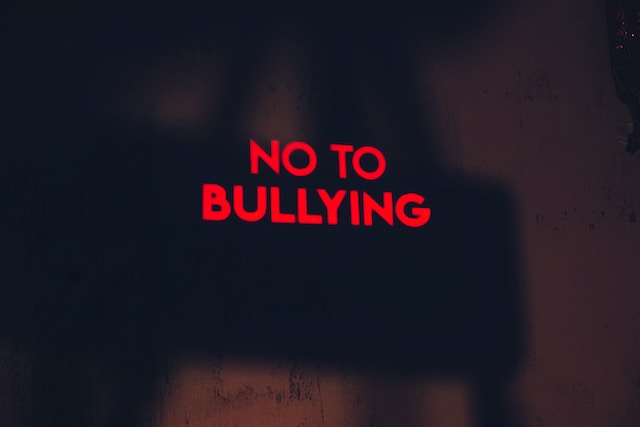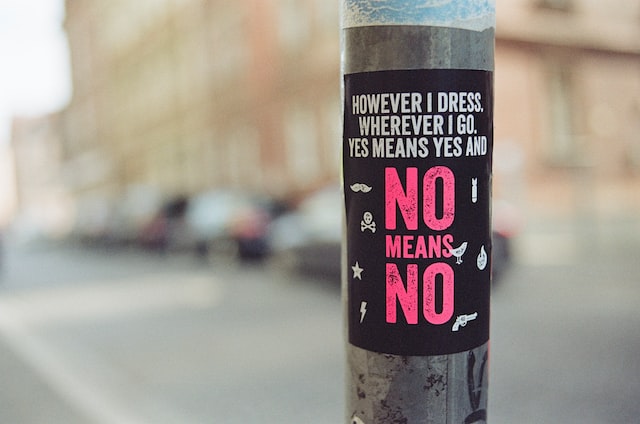Bullying is defined as repeated and unwanted aggressive behaviour that involves an imbalance of power. The behaviour is intended to harm, humiliate, or intimidate the victim. Harassment, on the other hand, is a single incident or series of incidents of offensive or unwelcome behaviour. It’s not always directed at a specific person, and it doesn’t necessarily involve an imbalance of power.
What is bullying?
(Photo by Road Ahead on Unsplash )

Bullying is a pervasive and harmful form of aggressive behavior that involves the repeated mistreatment of an individual by another person or a group. It is characterized by an intentional and systematic abuse of power, often stemming from a real or perceived power imbalance. Bullying can manifest in various forms, including physical, verbal, and psychological actions, as well as through exclusion and manipulation.
In physical bullying, the bully employs physical force or violence to intimidate, harm, or dominate the victim. This may include hitting, pushing, tripping, or damaging personal property. Verbal bullying, on the other hand, involves the use of words, insults, slurs, or derogatory remarks to belittle, humiliate, or demean the targeted individual. Psychological bullying relies on tactics such as spreading rumors, gossiping, blackmailing, or manipulating emotions to exert control and cause emotional distress.
Bullying can occur in different environments, with schools being a common setting. It can involve students targeting their peers, often based on factors like appearance, academic performance, or social status. Workplace bullying is another prevalent form, where employees are subjected to repeated mistreatment, humiliation, or exclusion by their colleagues or superiors. Cyberbullying has become increasingly prevalent with the rise of digital platforms, involving the use of technology to harass, threaten, or intimidate individuals online.
The consequences of bullying are significant and far-reaching. Victims may experience a range of negative effects, including low self-esteem, anxiety, depression, social withdrawal, and academic or job performance decline. In severe cases, bullying can lead to self-harm, suicidal ideation, or suicide attempts. It is crucial to recognize the signs of bullying and intervene promptly to support the victim and address the issue.
Efforts to prevent and combat bullying have gained increased attention in recent years. Schools, workplaces, and communities implement anti-bullying policies and programs to promote awareness, education, and support for both victims and perpetrators. It is essential to foster a culture of respect, empathy, and inclusion, where everyone feels safe and empowered to address and prevent bullying behaviors.
What is harassment?
(Photo by Mikhail Nilov)

Harassment refers to unwanted and persistent behavior that is intended to disturb, intimidate, or cause distress to another person. It involves a pattern of repetitive actions or comments that create a hostile or uncomfortable environment for the victim. Harassment can occur in various contexts, including the workplace, educational institutions, public spaces, or online platforms.
Harassment can take many forms, including verbal, physical, sexual, or psychological acts. Verbal harassment involves using offensive language, insults, threats, or derogatory remarks to demean or humiliate the target. Physical harassment involves unwanted physical contact, such as touching, pushing, or assault. Sexual harassment, specifically, involves unwelcome sexual advances, comments, requests, or other behaviors that create a hostile or intimidating environment.
Psychological harassment, also known as emotional or mental harassment, targets an individual’s emotional well-being through tactics like stalking, gaslighting, persistent criticism, or intimidation. Cyber harassment, or online harassment, takes place in the digital realm and involves the use of technology to harass, stalk, threaten, or defame someone through messages, emails, social media, or other online platforms.
Harassment can have severe consequences on the victim’s well-being, including emotional distress, anxiety, depression, loss of self-esteem, and even physical health issues. It can also impact the victim’s professional or educational performance and create a toxic and unwelcoming environment for individuals to thrive.
Addressing harassment requires proactive measures to prevent and combat such behavior. Many organizations and institutions have implemented policies and procedures to raise awareness, provide education, and establish mechanisms for reporting and addressing incidents of harassment. Legal frameworks in many jurisdictions define harassment as a punishable offense, offering protection and remedies for victims.
Creating a culture of respect, empathy, and accountability is crucial to combating harassment. It involves promoting awareness, fostering open dialogue, providing support to victims, and holding perpetrators accountable for their actions. Everyone has a responsibility to actively contribute to a safe and inclusive environment where harassment is not tolerated.
Bullying Vs. Harassment – Key differences
Bullying and harassment are two distinct forms of harmful behavior, although they share some similarities. Understanding their key differences can help in addressing and responding to these issues effectively.
Bullying refers to a pattern of repeated and intentional mistreatment, where an individual or group exerts power over another person. It often involves a power imbalance, with the bully targeting someone perceived as vulnerable or weaker. Bullying can take various forms, including physical, verbal, and psychological actions, such as physical assault, name-calling, spreading rumors, or social exclusion. It commonly occurs in settings like schools or workplaces.
Harassment, on the other hand, encompasses unwanted actions, comments, or behavior that cause distress or discomfort to another person. It can occur in different contexts, including workplaces, educational institutions, public spaces, or online platforms. Harassment is characterized by the creation of a hostile or intimidating environment for the victim. It can manifest in different forms, such as verbal harassment (insults, threats), physical harassment (unwanted touching), sexual harassment (unwanted sexual advances or comments), or online harassment (cyberbullying, stalking).
While bullying can be a type of harassment, not all harassment constitutes bullying. Bullying typically involves repetitive and targeted mistreatment, whereas harassment can occur as a single isolated incident. Bullying often centers around power dynamics and the intention to assert control or dominance over the victim, while harassment can be motivated by various factors such as prejudice, discrimination, or personal animosity.
Another distinction lies in the focus of the behavior. Bullying primarily targets individuals, aiming to harm, intimidate, or isolate them. Harassment, on the other hand, can target individuals or groups, aiming to create a hostile or offensive environment for the victim(s).
Addressing bullying and harassment requires specific strategies tailored to their respective dynamics. Preventing bullying involves fostering a positive and inclusive environment, promoting empathy and respect, and educating individuals on appropriate behavior and bystander intervention. Harassment prevention involves creating policies, providing training, and establishing reporting mechanisms to address all forms of harassment, including sexual, racial, or online harassment.
Bullying involves repeated intentional mistreatment with a power imbalance, often occurring in specific settings. Harassment encompasses various unwanted actions or comments that create a hostile environment, which can include bullying but extends beyond it. Understanding these distinctions helps in developing targeted interventions and creating safe and inclusive spaces for everyone.
How to deal with bullying and harassment
Dealing with bullying and harassment requires a proactive and comprehensive approach to address the issue effectively. Here are some steps to consider:
Recognize and understand the problem: Educate yourself about the signs and types of bullying and harassment. Be able to identify when it is happening to yourself or others.
Document incidents: Keep a record of each bullying or harassment incident, noting dates, times, locations, descriptions of events, and any witnesses present. This documentation can be valuable when reporting and addressing the issue.
Seek support: Reach out to trusted individuals, such as friends, family, or colleagues, who can provide emotional support and guidance. It’s important to share your experience and not face it alone.
Report the incidents: If you are a victim of bullying or harassment, report the incidents to the appropriate authorities or supervisors. This can be a school counselor, HR department, or relevant higher authority, depending on the setting. Provide them with your documented evidence to support your claims.
Follow organizational policies and procedures: Familiarize yourself with the policies and procedures in place to address bullying and harassment. Comply with the reporting and investigation processes outlined by your organization or institution.
Maintain personal safety: If you feel physically threatened or in immediate danger, remove yourself from the situation and seek help from authorities or security personnel. Your safety should be the top priority.
Seek professional assistance: If the bullying or harassment persists or has severe effects on your well-being, consider seeking guidance from a counselor, therapist, or support group. They can provide coping strategies, emotional support, and help you navigate through the challenges.
Encourage bystander intervention: If you witness bullying or harassment, speak up and support the victim. Bystanders can play a crucial role in stopping or preventing further incidents by showing solidarity and reporting the behavior.
Foster a culture of respect and inclusion: Promote awareness and education about bullying and harassment in your community, workplace, or school. Encourage discussions, workshops, or training sessions to create an environment that values respect, empathy, and diversity.
Monitor and evaluate progress: Keep track of any changes or improvements made in addressing bullying and harassment. Assess the effectiveness of prevention measures and intervention strategies implemented, and make adjustments as necessary.
Remember, addressing bullying and harassment requires collective efforts. By taking action and supporting one another, we can create safer and more inclusive environments for everyone.
Featured Image By Markus Spiske on Unsplash








